[March 8 is International Women’s Day] Supporting women who are left behind in the COVID-19 pandemic: Initiatives in Bolivia and India to assist entrepreneurs and prevent domestic violence
2022.03.08
The ongoing spread of COVID-19 is having a major impact on various people around the world. Among them, women and girls, who are often in a vulnerable position, have lost their means of livelihood and are increasingly affected by domestic violence, thus putting their daily lives in jeopardy.
JICA has been implementing 11 projects in 10 countries to figure out the gender issues amid the COVID-19 crisis. Today, JICA is listening to the voices of women and girls in the field to understand the serious situations they are facing, and is taking steps to improve the situation. Among these initiatives, this article will introduce a project from Bolivia that aims to acquire digital technology in order to increase the income of women entrepreneurs who work at micro-, small and medium-sized enterprises (MSMEs), and a project from India that aims to prevent domestic violence in the entire community.
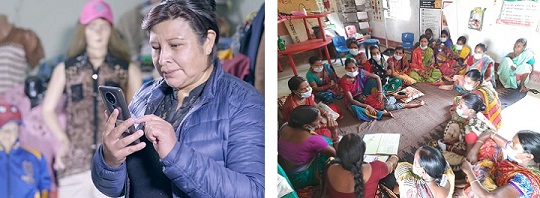
(Left) A Bolivian woman making use of digital technology in her business
(Right) In India, educating women on how they can seek help if they are victims of domestic violence
In Bolivia, about 80% of micro-enterprises with four or less employees are operated by women. Those who were selling goods and food on the streets and in small stores were severely impacted by the lockdown and lost opportunities for income.
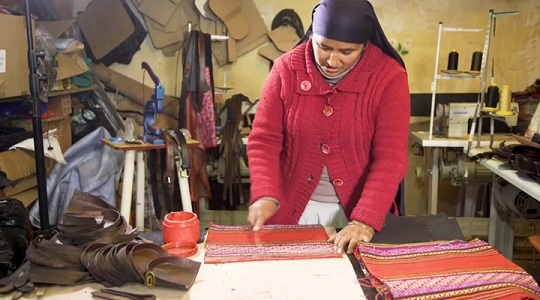
A woman making and selling leather goods. In Bolivia, 80% of micro-enterprises are run by women
In Bolivia, where almost everyone owns a smartphone, the JICA Bolivia Office launched a digital education platform to help these women learn how to utilize digital technology in their businesses. Using video, they acquire knowledge on the five key areas necessary to develop a business with digital technology, such as “digital banking” and “social network marketing.”
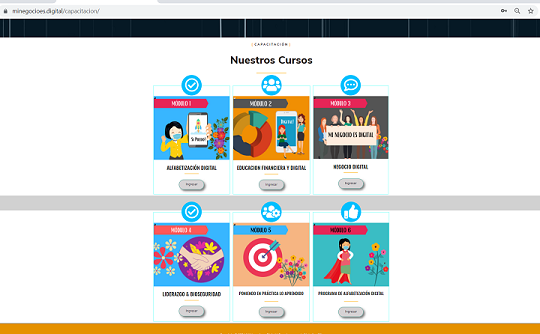
A video provided on the digital education platform
The following are some of the comments received from the approximately 1,500 micro-enterprise women owners who learned digital skills through this platform.
“I was at a loss of what to do when the prolonged lockdown reduced my income to zero. Through learning from this digital education platform, I was able to utilize my smartphone and expand the scope of my business.” “I think I can now earn more money than before. Many people are using social networks, so I feel that this method of sales meets their needs.” “I used to be afraid of using social networks for business, but now that I have acquired the correct knowledge, I feel confident using them.” “I was able to connect with people who are doing business digitally, and that gave me courage.”
In collaboration with a Bolivian start-up company, this project has also developed a job-matching app that allows anyone to securely find a job, targeting young women in the service industry, where the employment situation is deteriorating due to the COVID-19 crises. Through this app, users also have access to the digital education platform, which supports more women to acquire digital skills and develop their own businesses.
Carmen Silva, a national staff member in charge of this series of initiatives at JICA Bolivia Office, said, “By supporting Bolivian women entrepreneurs and women technicians via virtual training, providing them with skills related to the use and management of technology, and information on financial inclusion, we have also been able to assist in developing their entrepreneurship. They have been able to increase their incomes, which has led to their ability to financially support their families in the pandemic.” On the other hand, she added, “public policy implementation is still lacking to develop capacities such as financial inclusion for women’s economic independence,” as she looks ahead to future initiatives.
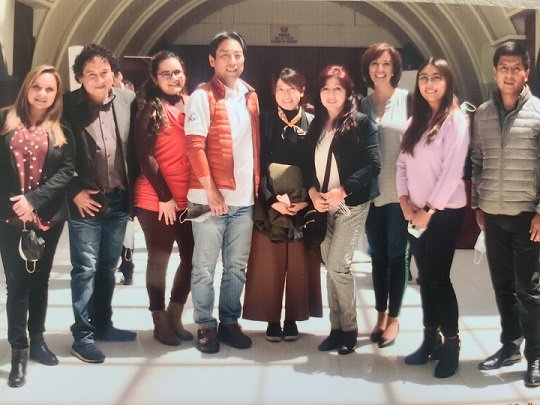
JICA personnel and the members of a support group that facilitated assistance for women entrepreneurs in Bolivia. Fourth from right is national staff member of the JICA Bolivia Office, Carmen Silva
In India, where sexual and gender-based violence (SGBV), such as child marriage, forced marriage, domestic violence, and rape exist, there has been an increase in various forms of violence perpetrated against women and girls as a result of the COVID-19 pandemic.
The number of consultations and reports of domestic violence received by the National Commission for Women (NCW) helpline in India increased 2.3 fold compared to the week before and after the lockdown. It is said that violence is induced when the family spends more time together due to mobility restrictions, and the added stress caused by the husband's unemployment and financial insecurity. Also, the fact that violence against wives is tolerated when husbands believe that their wives are not taking good care of the family is another factor that contributes to the high incidence of domestic violence.
Under these circumstances, the project started with the support of the Centre for Youth Social and Development (CYSD), an NGO in the eastern Indian state of Odisha, to train volunteers to respond to SGBV so that women who have been victimized can seek help. These volunteers are called the SGBV warriors.
In each of the state’s 90 villages, four SGBV warriors, men and women, are selected from among the local residents. In addition to having received training on how to support women who are victims of violence, the SGBV warriors share information on how to respond to the situation with each other and conduct regular discussions on solutions. In addition, help desks have been established in each village to provide residents with information on SGBV and guidelines on how to prevent it.
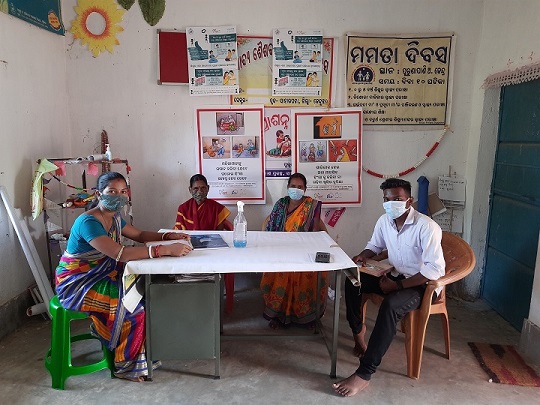
SGBV warriors having a meeting at a help desk
As a result, there is a growing community-wide actions to prevent SGBV. These include cases such as, “the SGBV warriors convinced a husband that violence against his wife is a crime and not to perpetrate violence again. Now, with the warning and monitoring by the SGBV warriors, the violence has stopped.” “When the helpline received a report from a resident that a 15-year-old girl was getting married, the SGBV warriors visited the home of the man she was marrying and explained that marriage under the age of 18 is prohibited by law. The parents of the girl signed a document stating that they would not allow their daughter to marry until she turned 18.”
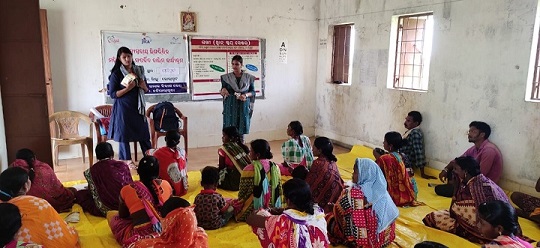
Women receiving training to become SGBV warriors
Also, through training men as SGBV warriors and involving them in the protection of victims, many more men are now taking action against SGBV and promoting gender equality.
An SGBV warrior and a community leader in his twenties says, “Violence against women was so common and I wanted to help but had no idea how. However, when I started participating as an SGBV warrior, I learned specifically how to respond to SGBV victims and was able to put it into practice. I would like to continue with this activity.”
With the efforts of the international community so far, gender disparities in society have been greatly reduced. Despite this, discriminatory practices and laws based on gender still remain in many countries, and women do not have full opportunities to participate equally with men in decisions that affect their lives. For example, even before COVID-19, 129 million girls worldwide did not attend school, and it is estimated that 250 million girls were married before the age of 15 (Note 1).
This situation is becoming increasingly apparent as the COVID-19 continues to spread. Moreover, serious social and economic consequences are on the rise, such as 11 million girls have lost their educational opportunities and 45 million women have lost their jobs. This survey has also revealed that the unemployment rate is higher for women than for men in each country, and domestic violence has increased by 30% (Note 2).
JICA has set five priority areas as follows: (1) Women’s economic empowerment, (2) Women’s rights and security, (3) Women’s education and lifetime health, (4) Gender responsive governance, and (5) Gender responsive infrastructure, especially for the improvement of women’s lives. After analyzing the issues surrounding women and girls, we will implement effective initiatives to enhance their capacities to realize their potential, to transform institutions and systems, and to change people's attitudes and behaviors.
Based on the results of these 11 projects in 10 countries, we will continue to focus on the elimination of SGBV, which has become a serious issue in many more countries. These initiatives are essential to overcome the impact of various crises, not only COVID-19, and to achieve a society that is resilient to all crises and in which everyone can live comfortably.
Note1
Note2
scroll